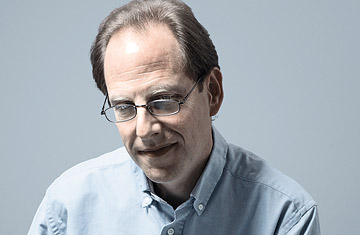
Simon Baron-Cohen of the University of Cambridge is taking a broader view of mating habits and their consequences
(2 of 3)
That willingness to go out on a limb, to take intellectual risks and float ideas that may or may not prove to be entirely true, has made Baron-Cohen, 53, a kind of pop-science hero ("a celebrity," as a camera-wielding fan in San Diego put it) and a controversial figure. He most dramatically wandered into fraught territory in 2003, when he published the book The Essential Difference, which called autism a manifestation of an extreme "male brain" — one that's "predominantly hard-wired for understanding and building systems," as opposed to a "female brain," one that's "predominantly hard-wired for empathy" — and ended up on the wrong side of the debate on science and sex differences.
His public comment that autism should be seen as an extreme case of systemizing traits shared by all of us — traits that can have positive aspects, that should be cultivated and not "cured" or "defeated," in the words of activists — has earned him the ire of some parents of autistic children, who complain that he underestimates their families' suffering. Thomas Insel, director of the National Institute of Mental Health in Rockville, Md., says some of the tension between Baron-Cohen and his detractors stems from the fact that they're focusing on very different autistic populations. "Simon has focused on what used to be called high-functioning autism. These people are very different from 7-year-olds with severe language disorders, severe systemic problems," he says. "But he has this enormous popularity among the social-neuroscience community — deservedly. He's really one of the founders of the field. He just seems to get into controversy even when he's not looking for it."
Baron-Cohen's outspokenness — uncharacteristic among research scientists, who are typically cautious and reserved — links him not only to his more famous cousin Sacha but to a family with a lot of out-of-the-box creative thinkers. Simon's brother Ash Baron-Cohen is a movie director, his daughter Kate Baron is a singer-songwriter, and his son Sam Baron is a comic filmmaker. Simon attended Oxford as an undergraduate, majoring in human sciences, and was introduced to the field of autism in the early 1980s when he began work as a teacher in a small program for autistic children. At the time, though, there was no concept of autism as a spectrum disorder that ranges from mild to severe. The term Asperger's didn't come into widespread use until the 1990s. Autism was so poorly known, Baron-Cohen has said, that when he told people about his work, they frequently misunderstood and thought he said he was teaching "artistic" children.
By the time he received his Ph.D. in psychology at University College London, Baron-Cohen had begun pioneering research into the specific kind of social deficit typical of autistic kids. He showed that such children had difficulty developing a "theory of mind": the ability to perceive that other people have thoughts, perceptions and feelings different from their own. His lab has developed software aimed at teaching social skills to young autistic children (by helping them recognize facial expressions as modeled by animated train engines) and has worked to simplify and disseminate screening tools for autism that can be easily used by family doctors and pediatricians.
When Baron-Cohen began his work with autistic children in the 1980s, the condition was believed to exist in only 1 out of 2,500 kids. Today 1 in 110 is thought to be on the spectrum. This explosion in diagnoses appears to be linked to much more than just better screening. There are genetic factors at work too, aided, it is believed, by still unknown environmental factors and perhaps — the assortative-mating theory proposes — by social change as well. The same decades that saw a vast increase in the prevalence of autism witnessed an unprecedented movement of women into math and science professions. This meant that future parents with similar talents and temperaments — not just like-minded but like-brained — began getting together to a greater extent than ever before. The dotcom boom raised the social capital of high systemizers enormously, making them more desirable as mates. It is possible, Baron-Cohen has suggested, that people who have Asperger's or who simply have much higher than average levels of autistic traits without any full-blown disorder have been marrying and having children at greater rates than ever before.
Until now, this theory has been largely speculative — and has drawn some criticism. "It makes for a great story, but there's a lot of damage that can be done if parents think that because they have these traits, they've caused their kid's condition," says John Constantino, director of the William Greenleaf Eliot Division of Child and Adolescent Psychiatry at Washington University in St. Louis. With his own research team, Constantino has found that while strong systemizers sometimes paired up — and that when they did, there was strong reason to believe they were indeed at increased risk of having an autistic child — such couples weren't getting together and having autistic kids at anywhere near the rate that would begin to account for the real rise we've seen in autism numbers over the past few decades.
